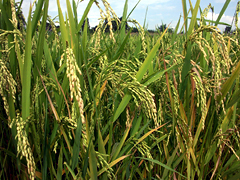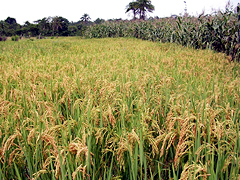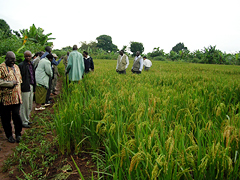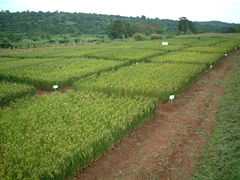The Grant Assistance for Underprivileged Farmers: Dissemination of NERICA and Improved Rice Production Systems in Uganda (through the Food and Agriculture Organization of the United Nations (FAO))
February 28, 2006
- The Government of Japan has decided to extend "The Grant Assistance for Underprivileged Farmers (2KR)" amounting 147 million yen (approximately 1,370,000 dollars), through the Food and Agriculture Organization of the United Nations (FAO), for the dissemination of NERICA (New Rice for Africa) and improved rice production systems in the Republic of Uganda. Notes to this effect were exchanged on February 28 (Tue) in Rome between Mr. Yuji Nakamura, Japanese Ambassador to Italy, and Mr. David Harcharik, Deputy Director General of FAO.
- Japan has been assisting dissemination of NERICA (New Rice for Africa) in African countries. NERICA has been developed through crossing Asian rice species - high yield potential - and African rice species resistant to disease and weed. As rice is produced in Africa extensively by underprivileged farmers, the dissemination of NERICA, which promises high yields without improved irrigation and much input of fertilizers, is expected to contribute to alleviation of food shortage and poverty reduction in farming villages by enabling farmers to earn a better income. Japan has announced at the Tokyo International Conference on African Development (TICAD) II and III that the dissemination of NERICA was one of its concrete assistance measures of TICAD initiative. In 2005, Japan explained developments of our effort on NERICA at the Asian-African Summit as well as at the G8 Gleneagles Summit Meeting. Japan has been extending assistance by, for example, supporting research and development of NERICA through the West African Rice Development Association (WARDA) and cooperating with the experimental cultivation of NERICA by the dispatch of experts of the Japan International Cooperation Agency (JICA).
- The challenge of NERICA in Uganda today is to share widely knowledge of benefit and usefulness of NERICA among ordinary farmers. This project is intended to provide Ugandan farmers with NERICA seeds and provide necessary training at "Farmers' Field School," a training system of FAO to raise the technical knowledge of farmers. In concrete terms, NERICA IV, whose unit crop yields are 30% higher than local rice and whose growth to harvest is 20-30% faster, will be cultivated in a total of 1,000 ha of fields in the eastern, central and western parts of the country. Farmers of 6,000 households will be provided with the seed, fertilizer, pedal threshers. They will also receive training in sowing and fertilizing for cultivation post-harvest technique after threshing. Farmers will also learn about self production of seed and the distribution system.
- Uganda has good conditions for NERICA dissemination. First it has a national policy of promoting the production of upland rice spices including NERICA. Second, rice consumption is increasing. Third, abundant rain and rich soil in the country makes double cropping possible. Fourth, groundwater runs near the surface. Japan hopes to make successes on the dissemination of NERICA in Uganda and Guinea, and expand the area of NERICA dissemination to other African countries.
- It is hoped that Japan's assistance will contribute to improving rice production in Uganda through the dissemination of NERICA, and alleviating poverty and food shortage.
 NERICA before harvest |
 NERICA at a farm |
 NERICA at a farm |
 NERICA at Namulonge Research Station |
(END)
![]() Related Information (Agriculture)
Related Information (Agriculture)
![]() Related Information (Japan-Uganda Relations)
Related Information (Japan-Uganda Relations)
Back to Index
